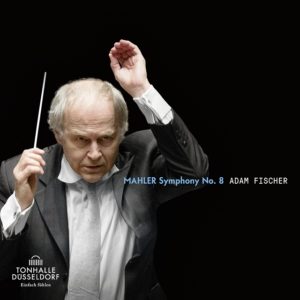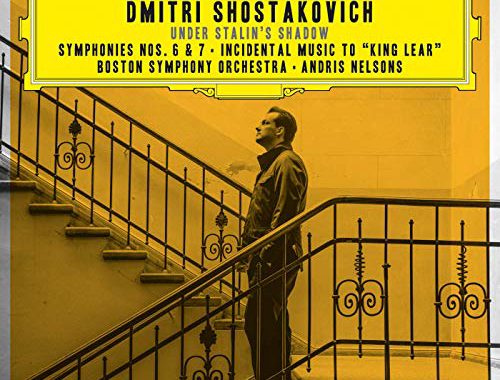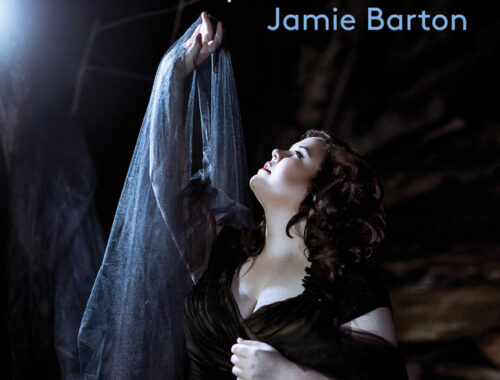GRAMOPHONE Review: Mahler Symphony No. 8 – Soloists, Choirs, Düsseldorf Symphony Orchestra/Fischer
 Rather as he did for his controversial (and somewhat disappointing) account of Das Lied von Der Erde Adam Fischer offers a kind of apologia in the liner note as to the particular challenges of the Eighth Symphony and how one seeks to address them in performance and recording. I rather like his reference to the work’s ‘crowd scenes’ and I certainly appreciate his analysis with regard to how one might balance scale against precision and clarity. But the end result is disappointing not just on account of its failure to blow one’s socks off sonically but because, for various reasons, it fails to engage emotionally. Overwhelming it is not.
Rather as he did for his controversial (and somewhat disappointing) account of Das Lied von Der Erde Adam Fischer offers a kind of apologia in the liner note as to the particular challenges of the Eighth Symphony and how one seeks to address them in performance and recording. I rather like his reference to the work’s ‘crowd scenes’ and I certainly appreciate his analysis with regard to how one might balance scale against precision and clarity. But the end result is disappointing not just on account of its failure to blow one’s socks off sonically but because, for various reasons, it fails to engage emotionally. Overwhelming it is not.
It doesn’t begin well. There is precious little heft, thrust, uplift in the opening proclamation Veni creator spiritus. The tone is not exultant, the rhythm sluggish. This mighty motet needs to feel imperative from the very start and if that sense of a driving march is not immediately established then it’s harder making sense of what follows. Things do look up in the development beginning with the mighty exhortation Accende… lumen sensibus, rampaging trombones making their mark in pushing forward Fischer’s urgent tempo. But the boys chorus aren’t punchy enough and there isn’t that recurrent thrill along the way of the two sopranos whacking out notes above the stave. Indeed they are virtually inaudible in one or two of those key moments. I realise that Mahler wanted his soloists to be more a part of the choral texture in Part One but they really are too well integrated and their sound too thin and colourless – even as they plea for divine grace shortly after the start.
Fischer applies some big Mahlerian rubatos in this section opening out with rhetorical deliberation and effecting a mighty (unwritten) expansion into the recapitulation. But still one doesn’t experience that heart-stopping emotionally pull. Even the wave upon wave effect of the coda – a ‘crowd scene’ and then some – feels manufactured rather than irresistible.
Interesting that Fischer favours a suspended cymbal as opposed to shimmering ‘swishes’ in the prelude to Part Two. Again it is not leavened with the same intensity that a Tennstedt or Bernstein or even Solti manage. But it at least has its own atmosphere. The drama of Goethe’s Faust (the closest Mahler ever came to writing an opera) suddenly makes individuals of the solo voices and two of those voices – Hanno Müller-Brachmann (baritone) and Neal Cooper (tenor) – are seriously wanting, the former sorely stretched, even hoarse, in his solemn aria, the jagged string figurations leaping up around the voice and almost swallowing it whole. The tenor part’s high tessitura is notorious but Neal Cooper woefully lacks the essential heldentenor girth and come across (again the recording balance does not help him) as nasal and constricted at the top.
For the rest, Mahler’s heavenly high-jinks unfold playfully and jubilantly enough though there is not that sense of wonder when the Mater Gloriosa floats into view and we are invited to ‘gaze aloft’. That extraordinary orchestral passage (piccolos, flute, clarinet, harmonium, piano, harps, string quartet) ushering in the Chorus Mysticus is still heart-stopping but the entry of the chorus is hardly as Mahler requested ‘like a breath’.
Regular readers will know how much I have loved other instalments in this cycle – and perhaps I will again. But it’s interesting that the arrival of vocal elements seems to have stalled the magic for Fischer. And, rather crucially, there are no texts in the booklet (the same was true of the Das Lied) – a serious omission – and who else feels that the lack of ‘ident’ tracks (just two for the whole piece) is not exactly user-friendly?




